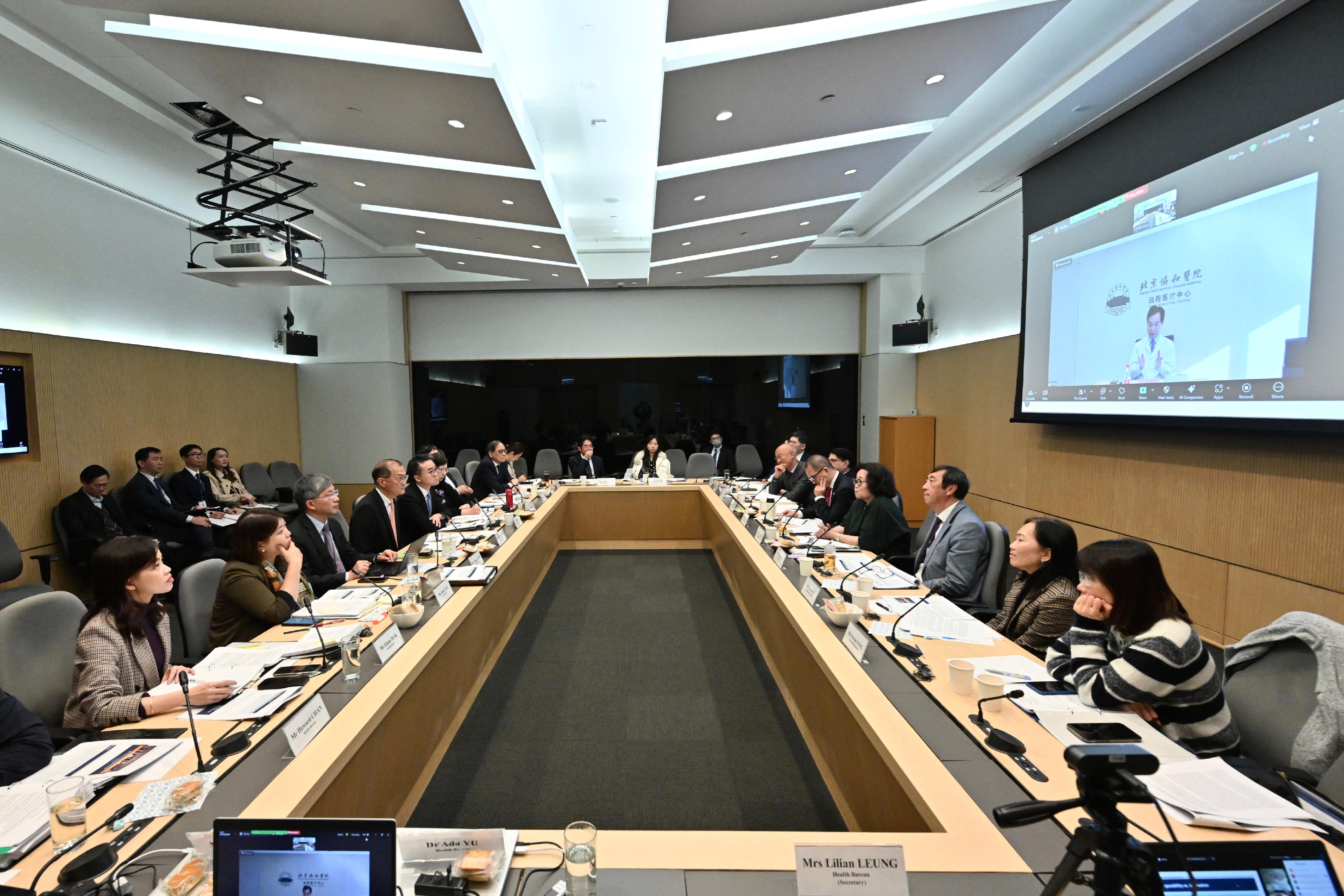Task Group on New Medical School announces invitation for proposals from universities to establish third medical school (with photo)
******************************************************************************************
The Secretary for Health, Professor Lo Chung-mau, said, "Hong Kong is facing challenges posed by an ageing population and a growing demand for healthcare services. The establishment of the third medical school is crucial to the future development of healthcare services in the city. Thanks to the advice from various expert advisors, the Task Group has already formulated the strategic direction and targeted position for establishing a new medical school over the past month or so since its formation. The Task Group considered that the new medical school should shoulder the mission of nurturing more talented doctors for practice in Hong Kong, thereby supporting the local healthcare system with a view to enhancing both the quality and quantity of healthcare services. Furthermore, the Task Group envisioned that the new medical school will adopt an innovative strategic positioning in pursuit of complementary development with the two existing medical schools to promote the excellence of medical education and research in Hong Kong, and to attract more local, Mainland and overseas medical talent to engage in teaching and research work, dovetailing with the city's development into an international medical training, research and innovation hub."
The Acting Secretary for Education, Dr Sze Chun-fai, said "The establishment of the new medical school can nurture more medical talent and enhance the academic and research excellence of the medical sector, which is conducive to developing Hong Kong into an international post-secondary education hub. The Education Bureau expects the new medical school to contribute to the overall development of the relevant university, with detailed planning on interdisciplinary or intersectoral collaborations, teaching resources, quality assurance, research strategy, sources of staff and students, and institutional governance etc. The new medical school should also interface with the applicable frameworks of the UGC. Moreover, as part of the Northern Metropolis University Town, the new medical school can introduce more research collaborations and exchange projects with neighbouring post-secondary institutions or industries in a flexible and innovative manner, which will help enhance the overall synergy."
The Task Group considered that UGC-funded universities are in a better position to establish a new medical school. To achieve the aforementioned objectives, the following 10 key parameters for consideration were set out by the Task Group for the universities' submission of proposals regarding the establishment of the third medical school:
1. Innovative strategic positioning: Complement the development of the two existing medical schools in Hong Kong to promote diversification and internationalisation;
2. Staffing: Recruit high-calibre international and local teaching professionals to establish a professional medical teaching and research team;
3. Campus and teaching facilities: Plan a modernised campus equipped with state-of-the-art teaching facilities to support innovative medical learning models;
4. Clinical exposure and learning resources: Illustrate the plan for a teaching hospital, and collaborate with healthcare institutions in Hong Kong and the Guangdong-Hong Kong-Macao Greater Bay Area to provide diverse clinical training opportunities;
5. Curriculum structure and assessment methodologies: Adopt an accredited medical curriculum framework, incorporating competency-based assessments and innovative teaching methods, such as provision of early clinical exposure;
6. Student admission arrangements: Offer a graduate-entry programme to attract both local and non-local students, achieving diversification and internationalisation of the medical curriculum;
7. Funding arrangements: Develop a diversified funding plan, combined with viable financial management, to ensure the long-term and sustainable development of the medical school;
8. Implementation plan: Formulate a comprehensive roadmap for the medical school's implementation, with phased progression in infrastructure construction, curriculum design, and faculty recruitment;
9. Teaching and learning quality: Ensure that the quality of medical curriculum meets international high standards, and leverage on innovative teaching and assessment methods to nurture high-quality medical professionals and enrich whole-person development; and
10. Research excellence: Promote medical innovation and scientific research development, and foster global partnerships to position the school as a leader in regional and international medical research.
The Task Group will issue invitations for proposals to all UGC-funded universities on December 2. The Government will hold a briefing session on December 10 to introduce to interested universities the arrangements for the submission of proposals on the establishment of a new medical school. The Secretariat of the Task Group will send out invitations for attendance to university representatives in due course. Universities interested in establishing a new medical school are required to submit their proposals by March 17 next year. At the next step, the Task Group will formulate concrete criteria for assessing proposals to ensure that a qualified and eligible university will be selected in a transparent and fair manner for the establishment of the new medical school. It is anticipated that the Task Group will complete its assessments and make recommendations to the Government within next year.
The Task Group on New Medical School was established in October this year to take up the responsibilities of devising the direction and parameters for establishing the new medical school, endeavouring to nurture more local medical talent and enhance Hong Kong's healthcare system, as well as promoting various measures for Hong Kong to become an international medical training, research and innovation hub. The Task Group comprises seasoned local, Mainland and overseas academics for medical teaching and university management, professionals, the Chairman of the Medical Council of Hong Kong, the President of the Hong Kong Academy of Medicine, as well as representatives from relevant government bureaux and departments.
Ends/Thursday, November 28, 2024
Issued at HKT 16:13
Issued at HKT 16:13
NNNN





